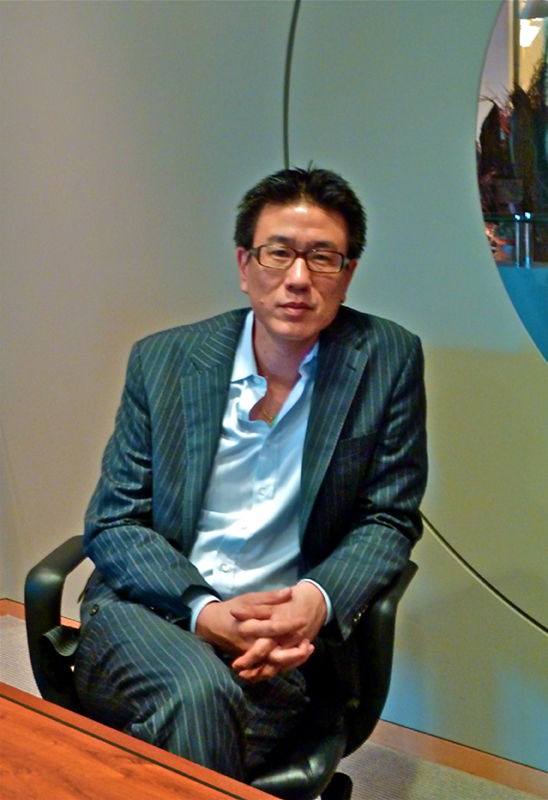By Cara Waterfall

Lucas Lung has the best of both worlds: the amenities of being a downtown lawyer coupled with the gratification of doing public interest work. Photo by Cara Waterfall/GLEANER NEWS
Lucas Lung has an aura of unflappability: he is tall, distinguished, and speaks in a carefully modulated voice. This unruffled persona has served him well in the courtroom, where he has battled Internet hate crimes and elder abuse, among other issues.
But the Seaton Village resident is unsettled by the attention he received for his Young Advocates’ Award for achievement in social justice this summer. “I don’t think what I’ve done in the last several years has been all that extraordinary,” he says. “I think it’s hard to put my record up against other people I know who devote a great deal more of their time and energy to this type of work.”
Lung, 38, sits in an airy boardroom, light flooding through immense windows. The sleek, modern office is one of the perks of being a “downtown lawyer” although his portfolio is anything but ordinary, with about a third dedicated to pro bono files. “Whatever I do, there’s always going to be some public interest component to it,” he says. “I have a very strange practice profile, but Lerners [LLP] has been ridiculously supportive of the work that I do.”
It has been a big year for Lung, who also won a landmark case in immigrant sponsorship this June. The Supreme Court declared that family members who sponsor relatives must support them, regardless of changed circumstances. He modestly describes the outcome as one of “divided success.”
His interest in social justice and strong work ethic stem from his upbringing. After his mother’s marriage “ended quite violently,” she emigrated from China to raise him and his two siblings on her own. Seeing her hard work provided him with the template for how he would conduct his life.
At the time, Vancouver was a city struggling to find its identity amid the influx of Asian immigrants; Lung experienced racism there and his overseas travel exposed him to a host of poverty-related issues.
In 2003, he accepted a three-month internship in Cairo with the Human Rights Commission to produce a report on the insecurities of the Burundian refugee community in that city, who had fled the Rwandan conflict. He was struck by the suffering of a young woman who had been raped by a group of soldiers. “There are things that happen in Canada as well, but certainly not to the extent where there’s an expectation,” he says. “What’s more frightening is that she accepts that that’s just a part of life, and here we would view that as completely extraordinary.”
The Cairenes’ treatment of “foreigners” like the refugees was eye-opening. “[They are] like many other cities in the world that are in countries that don’t have an immigrant history like we do here: they struggle with foreigners.”
It made Lung appreciate Toronto—with its cultural diversity and conveniences—even more. Although his relationship with the city got off to a rough start (as a law student, he stayed at a “dreadful hostel” in Kensington Market where he slept in a chair), he eventually met his future wife in the neighbourhood.
Lung remembers feeling like “a bit of a nomad” in law school compared to his classmates. “A lot of students were very linear in their thinking in terms of their careers,” he says. “There was an expectation that you would end up at a firm, you would keep going, you would become a partner, and you would die, and that’s it.”
Now his focus is “much more community-based.” His calendar has become even more crowded since he became a board member for St. Jude’s Community Homes, a non-profit agency that provides housing to individuals with mental health issues.
He sees all of his files within the context of his practice at the firm. “I don’t really distinguish between my paid clients and my unpaid clients. Your pro bono files have to be viewed as just any other file.”
Lung sees the law primarily as a platform for his public interest work, but it’s also a form of storytelling that fits as organically into his personal life as his professional one. “When I’m standing in court, obviously there’s the legalese, [but] I’m really not saying anything differently than what I would have been saying before I was a lawyer.”
For more information, contact: Mary Ann Freedman, Freedman & Associates Inc. for Lerners LLP
